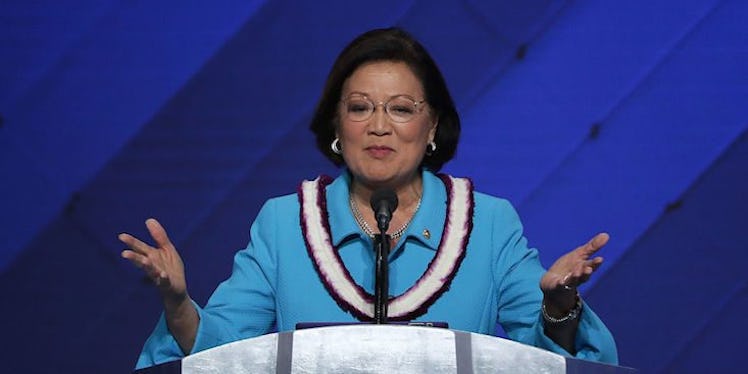
Democratic Senator Treated For Cancer Speaks About John McCain's Vote — EXCLUSIVE
Senator Mazie Hirono, a Democratic senator from Hawaii, announced that she was diagnosed with stage four kidney cancer in May. She had two surgeries -- one in May and one in late June -- and after each, she got back to work battling the GOP's efforts to repeal and replace the Affordable Care Act (ACA, aka Obamacare). On Tuesday, July 25, after getting those surgeries for the kidney cancer, Hirono voted against a repeal of Obamacare.
I spoke with Hirono about the health care debate in an interview with Elite Daily on Thursday, July 27.
"On a personal level, I was really grateful that I had health care, health insurance, because -- believe me -- cancer treatment is very, very expensive. If I had to be sitting here worrying about how I would pay for the treatment rather than focusing on what kind of treatment I should get, I would be very distressed and depressed, to say the least," Hirono says. "You know, that's what millions of people in our country are facing, though, with the [potential] repeal of the Affordable Care Act."
Across the aisle, a parallel story played out. Last week, Congress was shaken with the announcement that Senator John McCain was diagnosed with brain cancer. Then, on Tuesday, McCain returned to the Capitol and voted with Republicans to open the discussion on the repeal of Obamacare. His vote was met with applause from his colleagues and criticism from the public, who thought it ironic that after his own diagnosis, he was voting to move forward with a plan that would leave 32 million people without insurance by 2026, according to an analysis by the nonpartisan Congressional Budget Office (CBO).
Since then, the Senate has continued with votes on a series of possible health care plans. It's unclear exactly what's going on as Republicans do not seem to have an exact bill to vote on, and Obamacare repeal votes have been failing. Nevertheless, a "Vote-O-Rama" persists through Thursday night.
Hirono says she focused on a speech McCain gave following the vote to open discussions on Tuesday. In that speech, McCain criticized the Republicans for a messy health care process. He called for an open process of hearings and debates to figure out the best path forward for all Americans.
McCain said he would "not vote for this bill as it is today." Six hours later, McCain voted to help that bill move forward.
"I listened very carefully to his remarks, and sadly, his vote was a vote that enables Republicans to continue this path of no hearings and basically trying to cram a bill down everybody's throats that will be harmful to millions and millions of people in our country," Hirono says. "I very much respect John McCain ... and we're all wishing the best for him, of course. But, well, let's just say I wish he had voted the other way so that we could proceed to the kind of regular order that he talked about in his remarks."
For her part, Hirono says her diagnosis made the health care debate "that much more acute and personal," while she has "always considered health care to be a right, not a privilege" and advocates for health care for all.
"To have a diagnosis of stage four kidney cancer certainly pointed out to me that truly we are all one diagnosis away from a major illness," she says. "This lent a certain understanding, sympathy, urgency to the battles that we're fighting to make sure that the Affordable Care Act is not repealed by literally kicking millions and millions -- 20, 30 million people -- off health care and hurting everybody who's on Medicaid, everybody who has pre-existing conditions in our country."
Hirono's hope now is that Republicans "will not get enough votes to shove this through" -- whatever version of their bill "this" ends up being. If that happens, she hopes lawmakers like Senators Lisa Murkowski and Susan Collins -- Republicans who voted against party lines for their constituents' interest -- can move forward with productive discussions around improving Obamacare.
Until that happens, Hirono will continue doing what she can to prevent an ACA repeal.
"[When I was diagnosed] I said to my staff, 'Look, it's never a good time to get cancer, but this is a very timely circumstance where I can speak with tremendous conviction as to what people in our country face,'" the senator says.
So far, she has.